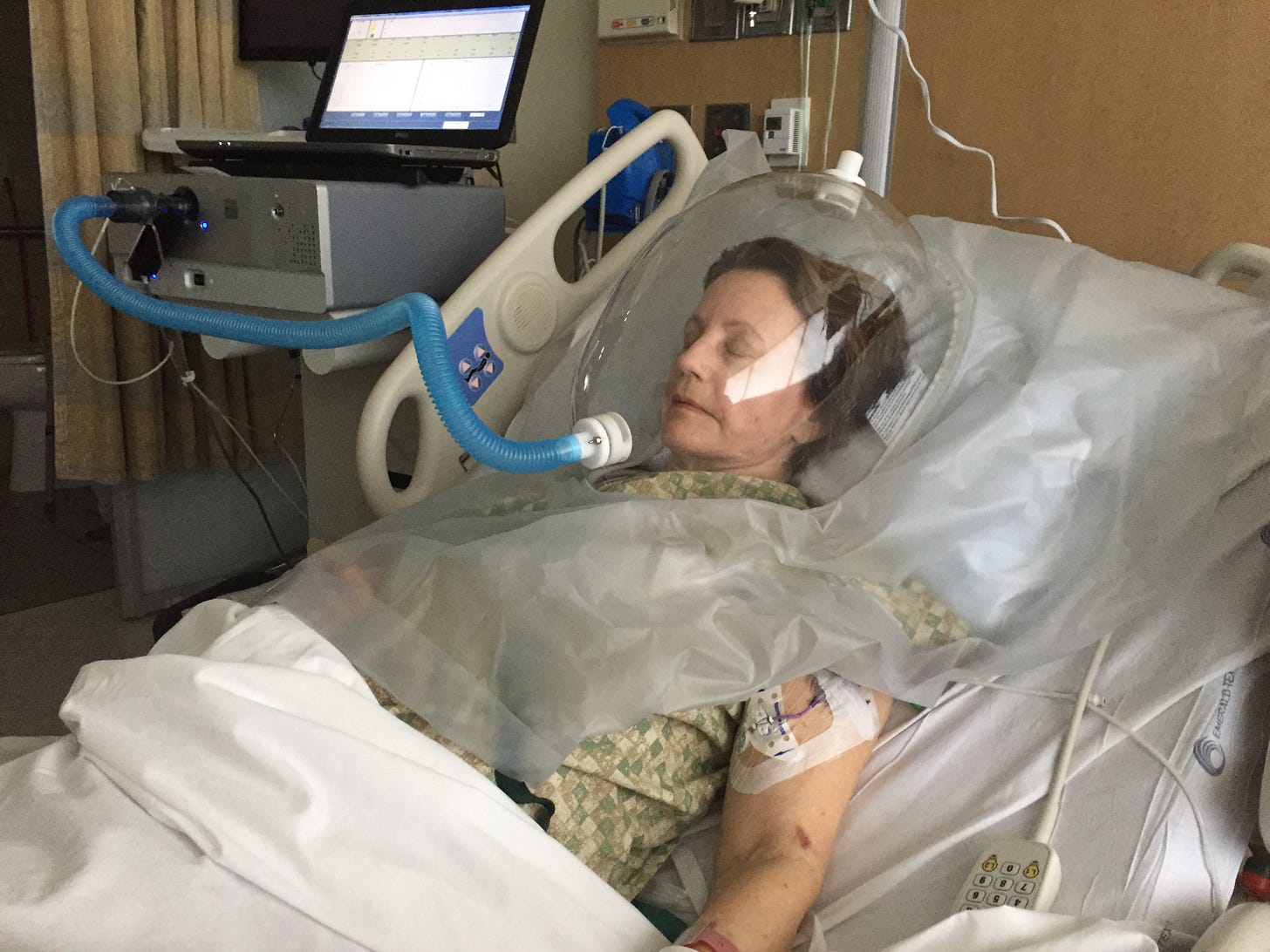Gratitude Is Good for Your Health
How a simple shift in focus can reduce stress, foster resilience, and help you find grace in the midst of suffering.
"In times of uncertainty, people realize how powerless they are to control their destiny. If you begin to see that everything you have, everything you have counted on, may be taken away, it becomes much harder to take it for granted."
—Dr. Robert Emmons
My second week at Sharp Memorial Hospital in San Diego, after five abdominal surgeries in fifteen days. I was off the ventilator but on a breathing treatment for Advanced Respiratory Distress (ARDS).
Tethered to my hospital bed with eight tubes attached to my body, I realized my life as I knew it was over. I had been air-evacuated out of Baja, Mexico, after two abdominal surgeries because of blunt force seat belt trauma in a near-fatal car wreck in the middle of the desert. Due to infections, I had three more abdominal surgeries and spent a week on a ventilator. I was in survival mode and knew that I had to surrender and accept that I didn’t know my destiny.
After hearing a voice in the black void between worlds,
“You get to choose how you go through this experience. What will you choose?”
In my conscious unconsciousness in the near-death experience, I thought:
"I don’t want to be a victim. I’ll choose the high road and use love and gratitude to heal.”
This statement gave me hope and a way to heal from all I’d been through and endured to survive. I had a miraculous recovery from five abdominal surgeries in fifteen days.
In moments of healing, grief, or profound transformation, the practice of gratitude can be one of the most profound tools we have.
Gratitude is more than a feel-good habit. Research indicates that gratitude has real, measurable impacts on the brain, the body, and our ability to navigate adversity.
Robert Emmons, a leading gratitude researcher and psychology professor at the University of California, Davis, notes that when we pause to reflect on what we appreciate, the calming part of our nervous system is activated. This not only reduces stress hormones like cortisol but can also boost oxytocin—the hormone that fosters connection and bonding.
Gratitude has been shown to:
Strengthen the immune system
Lower blood pressure
Reduce aches and pains
Enhance emotional resilience
But how do we practice gratitude in the middle of suffering?
It doesn’t mean pretending everything is okay. It doesn’t mean toxic positivity or denying the pain.
Emmons says that true gratitude involves transforming an obstacle into an opportunity. It means reframing a loss into a potential gain, a process that helps us see life through a redemptive lens.
I know this firsthand. After spending six weeks in the hospital and learning to walk again, I remained deeply grateful. Every time someone entered my hospital room—a nurse, a surgeon, or a friend—I felt a deep sense of appreciation. Gratitude was my lifeline.
So, what do we do when we don’t feel grateful? Emmons suggests we start by asking these questions:
What lessons did I learn from this experience?
Can I find ways to be thankful for what happened now, even if I wasn’t at the time?
What ability did the experience draw out of me that surprised me?
How am I now a better person because of it?
Has the experience removed a personal obstacle to gratitude?
In one study, people were asked to write about an unresolved painful memory. Some were instructed to look for what they could be grateful for in the experience. Those who did report more closure and fewer intrusive thoughts showed a stronger ability to move forward.
Gratitude, it turns out, helps heal even the most difficult stories.
Neuroscientist Glenn Fox, who has devoted his career to studying gratitude, has found that feelings of appreciation activate brain regions associated with pleasure, social bonding, and stress relief. He calls this heightened perception "HD gratitude" — a clearer, more vivid attunement to the small and large blessings of life.
Gratitude is also deeply relational. It invites us to acknowledge others, to be open to receiving.
I asked the nurse supervisor at Sharp Memorial Hospital's ICU if she could provide me with a stack of patient satisfaction surveys. Each night when I felt well enough, my husband, John, and I would fill out the surveys on my care providers.
Philosophers and spiritual teachers across various traditions emphasize gratitude as a gateway to grace.
Oprah and Deepak Chopra teach about finding grace through gratitude.
Albert Einstein said,
"There are only two ways to live your life. One is as though nothing is a miracle. The other is as though everything is a miracle."
When we operate from ego and the material world, we may feel disconnected, reactive, and alone. However, through gratitude, we tap into our higher Self, what some traditions refer to as the soul. From this place, we can trust that all will be well, even if we don’t yet see how.
Gratitude doesn’t erase suffering. But it makes us more resilient. It quiets our fear. It opens our hearts. And it reminds us that we are never alone.
Have you used gratitude to move through hardship?
I'd love to hear your reflections in the comments. Let's inspire each other.



Thank God you made it through to share your gratitude! xo